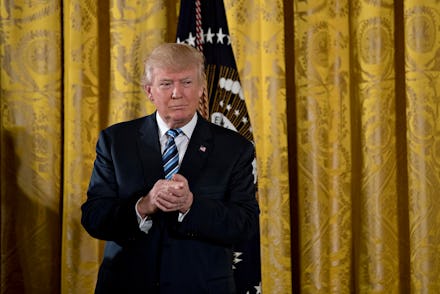Meet the group that just sued President Donald Trump for violating the Constitution

President Donald Trump had scarcely begun his first full week in the presidency when new legal troubles began to mount.
The first was a major new lawsuit, filed Monday morning at 9 a.m. in the Southern District Court of New York, which argues that Trump's plan to retain ownership of his businesses is unconstitutional, according to a statement.
The lawsuit is the brainchild of the watchdog Citizens for Responsibility and Ethics in Washington, and is led by several prominent legal minds.
Both former President Barack Obama's ethics lawyer Norm Eisen and former President George W. Bush's ethics lawyer Richard Painter are part of the team, and there are other groups with similar lawsuits in the works as well, waiting in the wings.
Responding to a question on the topic from NBC's Peter Alexander, President Trump reportedly called the suit "totally without merit."
Painter and Eisen have long argued, alongside others, that the president's businesses make it likely — if not inevitable — that Trump will violate the emoluments clause of the Constitution, which prevents U.S. office holders from accepting payments from foreign governments without congressional approval.
In fact, they argue that given the Trump Organization's many business dealings with foreign governments, Trump may be violating the Constitution already.
Trump's attorney, Sheri Dillon, has argued that the emoluments clause does not apply to fair-value transactions, which would theoretically put Trump in the clear, as long as he wasn't accepting quid-pro-quo bribes or getting paid more than the market rate for goods and servces rendered by the Trump Organization (a tough standard to actually enforce).
Dillon's assessment isn't totally without support: Andy Grewal at the University of Iowa College of Law published a position paper just last week supporting that analysis, and University of Virginia School of Law's Saikrishna Prakash described a similar interpretation of the clause in an interview with Mic.
But other legal scholars have chafed at this analysis, pointing out that if that were the case, then there'd be nothing standing in the way of the president accepting speaking fees from a head of state, to use one example.
There are a few key properties Monday's lawsuit will focus on, according to the legal filings, which were shared with Mic.
These properties include outstanding leases with the state-owned Industrial and Commercial Bank of China and the Abu Dhabi Tourism and Culture Authority; stays and events from foreign diplomats at the Trump International Hotel in Washington, D.C.; and businesses or investments in at least 10 other countries.
The lawsuit will likely have an uphill battle.
The legal team of Citizens for Responsibility and Ethics in Washington will need to establish "direct and concrete injury," the New York Times notes, which will be hard for them to do. To claim standing, CREW is citing "significant amount of time and resources since the election educating the public about the foreign emoluments clause and defendant’s violations of it."
The difficulty of establishing standing is why the American Civil Liberties Union has held off on a similar lawsuit, until they can find a (willing — and brave) hotel or bed and breakfast to serve as a plaintiff in the case, according to the New York Times.
On Monday morning, Hope Hicks, White House director of strategic communications told CNN's Jim Acosta that the president had resigned from his businesses as of Friday, which seems to contradict a Friday ProPublica report that Trump was still listed as the sole authorized representative of several companies.
That said, whether Trump resigns or not has little bearing on the lawsuit, said Jordan Libowitz, a spokesperson for CREW.
"The problem is payments. Of course he's resigned," Libowitz said. "The presidency of the United States is a full-time job, not some side gig."
People are permitted to bring civil suits against the president, as a result of a 1997 Supreme Court decision.
Representatives from the ACLU didn't immediately respond to request for comment; a spokesperson for Dillon's law firm, Morgan, Lewis & Bockius, said the firm does not comment on its clients or the work it does for them. A respresentative for the Trump administration didn't respond to multiple requests for comment.
Sign up for The Payoff — your weekly crash course on how to live your best financial life.